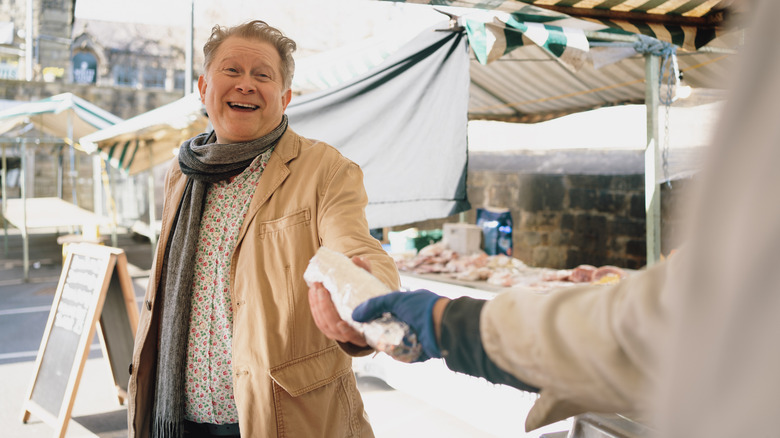Rick Steves Avoids These 'Haggle' Mistakes At All Costs When Traveling
In the same way that there are plenty of tipping mistakes to avoid in Europe and other parts of the world, travel writer Rick Steves knows that you can also make some mistakes when it comes to haggling while in a foreign country. Steves has ways to lower your cafe bill when dining in France, and has equally savvy tips for anyone hoping to make a purchase at a local shop or market for a fair cost. Any financial transaction in a place you are unfamiliar with — that has customs and a language different from your home — can be difficult to navigate, but in Rick Steves Europe, the globe-trotting expert lays out several ways to bypass making an error while negotiating with a local vendor.
First and foremost, Steves tells travelers to brush up on whether bargaining or haggling is even appropriate for where you are visiting, noting that in big cities like London making an offer is frowned upon, but in smaller markets in Greece, you're overpaying if you do not try to bring the cost down. Steves also advises figuring out if there is a price for you as a visitor versus a different price for everyday locals. Then, work with a vendor to come to a figure that's somewhere in the middle. This involves shopping around, asking different proprietors for prices on similar items, and eventually deciding what the item is truly worth to you.
Biggest mistakes to avoid while haggling
Steves knows that there are many ways you can inadvertently tank a sales negotiation while overseas: from hand gestures that can cost you more money to non-verbal signals that you are being scammed. Perhaps the most egregious mistake that you can make while attempting to go back and forth on a price in a local market is to show your enthusiasm, or lose your cool. Steves advises that anyone attempting to negotiate should curb their enthusiasm ahead of time so as to not show how interested they are in buying the specific item in question.
Also, never start by flashing cash. Instead, wait until you have finally settled on an agreed upon price before showing your money as a signal that you are indeed ready to go through with the transaction. Go Travel Daily added that once you offer a price, you cannot go back on it. This is part of the unspoken rules that Steves' emphasizes should not be broken under any circumstances.
What you should do while bargaining
If you are nervous to ask for a lower price on something you want to buy in Europe, don't be. Per Steves' experience, he recommends that you figure out the merchant's lowest possible price, and then not budging from that point. If the merchant wavers on that price, simply walk away. Either they will call after you to return and agree to pay that amount, or not and you begin with another vendor. This can take time, so Go World Travel Magazine suggested that anyone looking to haggle not be in a rush. Also, avoid wasting a vendors time by squabbling over an item that you have no intention of buying.
Another consideration that Steves highlights is the advantage of paying with cash to get a lower price — as many vendors prefer it, even if they take credit cards. With that said, be careful to avoid certain ATMs in Europe. Most of all, it's important to stay respectful and calm during negotiations. Also, if you can, try to speak the language in order to create a deeper bond, while showing you know what you are talking about in the vendor's native tongue. If you are not fluent, or feel uncomfortable attempting to communicate in the dominant language, Steves recommends asking for help from a third party who does speak it.


